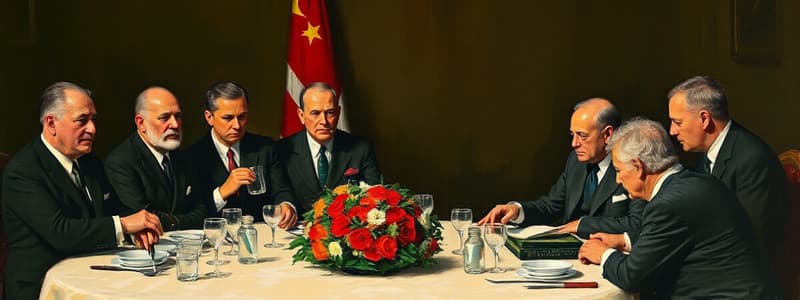Podcast
Questions and Answers
Which of the following was NOT a decision made at the Yalta and Potsdam Conferences in 1945?
Which of the following was NOT a decision made at the Yalta and Potsdam Conferences in 1945?
- The establishment of the European Union. (correct)
- The specification of Poland's borders.
- The division of Germany into four administrative zones.
- The 'denazification' of Germany and trials for war criminals.
Stalin fully honored his commitment to holding free elections in Eastern Europe after the Potsdam Conference.
Stalin fully honored his commitment to holding free elections in Eastern Europe after the Potsdam Conference.
False (B)
What was the primary reason for the establishment of the United Nations?
What was the primary reason for the establishment of the United Nations?
To maintain international peace and security, and to foster cooperation among nations.
The five permanent members of the UN Security Council have the power of ______, which can limit the UN's action capacity.
The five permanent members of the UN Security Council have the power of ______, which can limit the UN's action capacity.
Match the following UN agencies with their respective areas of focus:
Match the following UN agencies with their respective areas of focus:
Which of the following best describes the role of the UN General Assembly?
Which of the following best describes the role of the UN General Assembly?
The Paris Conference of 1947 focused primarily on treaties with the major Axis powers such as Germany and Japan.
The Paris Conference of 1947 focused primarily on treaties with the major Axis powers such as Germany and Japan.
Name two of the four key objectives outlined in the Charter of the United Nations.
Name two of the four key objectives outlined in the Charter of the United Nations.
Which of the following territories was NOT handed over to victorious powers after the Paris Conference of 1947?
Which of the following territories was NOT handed over to victorious powers after the Paris Conference of 1947?
The International Court of Justice, an important organization of the UN, is based in ______.
The International Court of Justice, an important organization of the UN, is based in ______.
Flashcards
Peace Conferences (Post-WWII)
Peace Conferences (Post-WWII)
Meetings between Allied leaders to plan post-war peace.
Yalta & Potsdam Conference Decisions
Yalta & Potsdam Conference Decisions
Divided Germany into four zones (US, USSR, UK, France); denazification; war crime trials; set reparations.
Paris Conference (1947)
Paris Conference (1947)
Countries allied with Germany lost territories and had arms production limited.
UN Objectives
UN Objectives
Signup and view all the flashcards
UN's Primary Goal
UN's Primary Goal
Signup and view all the flashcards
Self-determination (UN)
Self-determination (UN)
Signup and view all the flashcards
UN's Human Rights Focus
UN's Human Rights Focus
Signup and view all the flashcards
UN Specialized Agencies
UN Specialized Agencies
Signup and view all the flashcards
UN General Assembly
UN General Assembly
Signup and view all the flashcards
UN Security Council Permanent Members
UN Security Council Permanent Members
Signup and view all the flashcards
Study Notes
- Allies met in conferences to discuss how to achieve lasting peace after WWII.
Post WWII Conferences
- In 1945, leaders from the US, USSR, and UK met at the Yalta and Potsdam Conferences.
- Germany was divided into four zones, each administered by a victorious power: US, USSR, UK, and France.
- Berlin, situated in the Soviet zone, was also divided into four zones.
- The "denazification" of Germany was approved, as well as judging war criminals in the Nuremberg trials.
- Germany was required to pay reparations to the victors.
- Poland's borders were finalized.
- Stalin pledged to hold free elections in Eastern Europe, but this promise was not kept.
- The annexation of the Baltic countries and eastern Poland by the USSR was confirmed.
- In the Conference of Paris (1946-1947), treaties were signed with countries that had supported Germany: Italy, Hungary, Bulgaria, Romania, and Finland.
- These countries lost territories, which were handed over to the victorious powers.
- Their arms production was limited.
Creation of the UN
- The ineffectiveness of the League of Nations led to the San Francisco Conference in June 1945.
- Representatives from over fifty countries drafted the founding Charter of the United Nations (UN).
- Four objectives for the UN were outlined in the charter.
- Maintaining international peace & security: UN members must renounce the use of force and commit to resolving conflicts peacefully.
- The right to self-determination of peoples, referring to colonies of major powers.
- The defense and respect for human rights and freedoms, regardless of sex, age, race, religion, etc.
- The UN approved the Universal Declaration of Human Rights in Paris (1948).
- Promoting peaceful cooperation between nations: specialized organizations were created.
- These organizations focused on agriculture and food (FAO), health (WHO), education, science, and culture (UNESCO), and labor (ILO).
Structure of the UN
- All UN members are part of the General Assembly, which can only issue recommendations.
- The UN also has a General Secretariat.
- The Security Council makes the most important decisions, composed of the US, UK, Russia, France, and China.
- These countries have veto power, which can limit the UN's actions.
- Other important bodies include the International Court of Justice in The Hague, and the Economic and Social Council.
- The Economic and Social Council helps establish peaceful cooperation between countries.
Studying That Suits You
Use AI to generate personalized quizzes and flashcards to suit your learning preferences.




